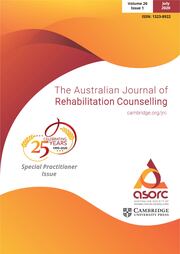Article contents
Examining the Attributions of Discrimination toward People with Mental Illness among Chinese College Students
Published online by Cambridge University Press: 27 April 2016
Abstract
The purpose of this study was to test the usefulness of the attribution model (Corrigan, Markowitz, Watson, Rowan & Kubiak, 2003; Weiner, 1995) in a Chinese cultural context to explain Chinese college students’ perceptions of discrimination toward people with mental illness. A total of 293 college students (male = 142; female = 151; age from 18 to 22) completed an Attribution Questionnaire (AQ) after reading vignettes, consisting of a male who either used illicit drugs or had a traumatic brain injury. Data were analysed using a hierarchical regression to determine the amount of variance accounted for in discriminatory behaviours by the attribution model. The results showed, when controlling for all other factors, that controllability and the three emotions (pity, anger, and fear) were found to be significant predictors of discrimination. The relationship between controllability, responsibility, and discrimination was not consistent with the attribution model since responsibility did not mediate the controllability of cause. These results provide support for the idea that disability attributions are culturally influenced.
- Type
- Articles
- Information
- The Australian Journal of Rehabilitation Counselling , Volume 22 , Issue 1 , July 2016 , pp. 40 - 50
- Copyright
- Copyright © The Author(s) 2016
References
- 1
- Cited by



